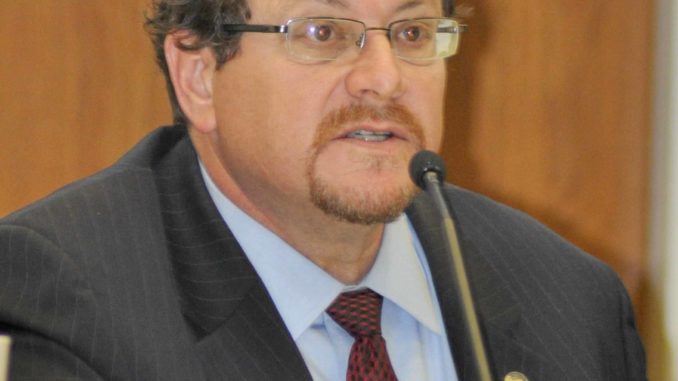
McCormick said pushing for change was difficult, is disappointed in lack of support from his party
Rep. Darrell McCormick (R-Yadkin), former co-chair of the state legislature’s 16-member Committee on Marine Resources, said his attempt to keep the gamefish-status bill (H 353) alive was the toughest legislative battle he’s ever faced, and he was taken aback by the lack of support of several key members of his own party.
The bill died in committee during the 2012 short session that ended in July.
He knew Sen. Don East (R-Surry) likely wouldn’t support a gamefish-status bill — that became clear early in the process — and two Democrats from the coast, Sen. Stan White (D-Dare) and Rep. Tim Spear (D-Tyrrell) also would oppose.
But McCormick was surprised when support from other Republican legislators waned, then changed. Two of those key members were Rep. Pat McElreth (R-Carteret) and Rep. Ruth Samuelson (R-Mecklenburg).
“I’m disappointed I didn’t get their support,” McCormick said. “They didn’t deal in the best interests of the state, and with the numbers so obvious.”
McCormick, who will not return to the legislature in 2013 because of redistricting, deals in numbers. He owns a commercial real-estate business in Winston-Salem, and bottom lines are his life.
It might seem strange a Piedmont representative would get involved in a coastal resources bill, but McCormick said he didn’t push for gamefish status and reorganizing marine resources management because he loves recreational saltwater fishing. He rarely fishes, except for a day or two during vacations.
When he started investigating, it was the numbers, he said, that were clear and so was his challenge.
“I (was) the commerce (committee) chair,” he said. “It was my job to find ways to help the state’s economy.”
The benefits of a bill to keep nets from targeting three fish species were as obvious as the razor-sharp teeth in a king mackerel’s mouth.
“We’ve got a potential $10 billion industry languishing because of $70 to $75 million,” he said.
In studying how other states manage their saltwater resources and the effect on their economies, McCormick said he discovered a National Oceanic and Atmospheric Administration (NOAA) report that offered statistics for every state with a coast line.
“Florida’s the big one,” he said. “This was a 2006 report, but it said Florida’s recreational fishing industry was worth in excess of $20 billion. Texas was at $19 to $20 billion, Louisiana $17 billion, then came Virginia, South Carolina and Georgia.
“But North Carolina has 400 miles of coastline, and if you counted our sounds and the back sides of the barrier islands, we easily could be in the $10 billion range annually, but it’s only $3 billion, all to save an $80 million industry (commercial fishing).
McCormick isn’t an enemy of commercial fishing, he said.
“The majority of commercial fishing, the main money-maker, is blue crabs,” he said. “The three fish I proposed to shelter account for only a small part, about 2 percent, of the total commercial catch. And even some day, if (the state) imposed a full net ban (as has been proposed) commercial fishing’s main source of income wouldn’t be affected.
“But my job as commercial chairman was to help allocate natural resources for the benefit of the state. We already have 45,000 people in the boat-building industry. That could increase a lot if there was a reason to buy a boat, namely to catch a fish.”
Also, he said, by protecting spotted seatrout, red drum and stripers, the state could reap the benefits of increased tourism dollars.
“We’ve got a built-in natural logistical advantage over Florida, Texas and Louisiana,” he said. “What if, for example, a bunch of guys who work at a Ford plant in the northeast take a Friday, Saturday and Sunday and decide to go to Louisiana or Texas to fish? They have to spend two days driving and one day fishing.
“But if we had the fisheries that would attract them, it’s a half-day driving to North Carolina and 2 ½ days fishing.”
Another reason McCormick took on the challenge was his constituency.
“I’ve got 2,300 (licensed) recreational saltwater fishermen in my district, which is three times more in my district than the total number of active netters,” he said.
McCormick said he thought he could accomplish something positive for the state’s economy but was surprised at the hardened attitudes against any changes in saltwater resource management in North Carolina.
“I got the Commercial Lien Act passed, and it’d been out there since 1982,” he said. “But this saltwater thing, well, it was 100 times harder to make headway.”
McCormick said he’d keep watching for progress and do anything he could to help North Carolina realize its full saltwater resources potential.
“People talk about preventing 2 percent of the commercial fishermen from netting these fish,” he said. “But (in H 353) they’d get paid for three years for their losses.
“What nobody sees is the single mom, working at a restaurant as a waitress that closes down because tourism from fishing dies in her town or the boat builder who lays off his workers because there’s no reason to buy a fishing boat,” McCormick said.
“So the question is simple — would you rather have $70 million or $3 billion?
“What would you choose?”



Be the first to comment